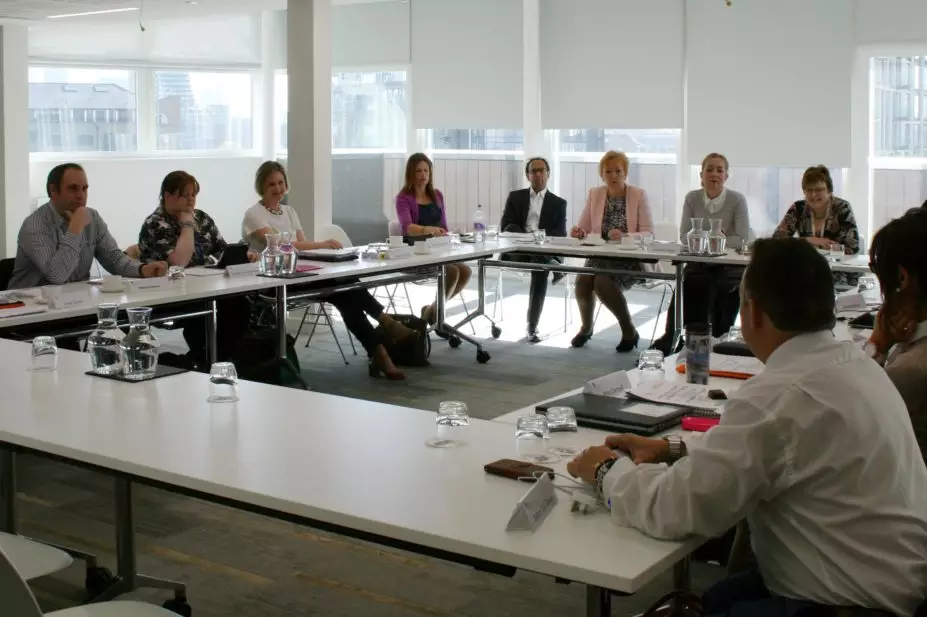
Maria Gonzalez / The Pharmaceutical Journal
On 6 October 2016, the Royal Pharmaceutical Society’s (RPS) English Pharmacy Board (EPB) met at the RPS’s London offices for its quarterly board meeting. Guests at the meeting included Amit Parekh, president of the British Pharmaceutical Students’ Association (BPSA); Tess Fenn, president of the Association of Pharmacy Technicians UK (APTUK); Gill Hawksworth, lead of West Yorkshire Local Practice Forum (LPF); Neera Goel, from Birmingham and Solihull LPF; and Brian Walters, the RPS’s new director of business development.
Speakers included Ian Bates, chair of pharmacy education at University College London school of pharmacy and expert advisor on education for the RPS, who presented his update on Health Education England (HEE). As the RPS representative on the HEE pharmacy advisory group, his key message was that there is an urgent need for the RPS to “focus on communicating stakeholder messages at the highest level” as HEE is “not fully appraised of the work of the RPS”.
Bates also spoke about “a new strata of workforce development boards” being constructed across England — local workforce action boards. He highlighted how they link to NHS England’s Sustainability and Transformation Plans (a way of developing the five-year forward view) and, as multiprofessional boards, will include pharmacy.
Also on the agenda was the topic of the Department of Health’s ‘Community Pharmacy in 2016/17 and beyond’ proposals. The board talked about the ‘Community pharmacy forward view’, a vision document developed by the Pharmaceutical Services Negotiating Committee, Pharmacy Voice and the RPS. Board members agreed that the collaboration of the three organisations had gone down well and that further collaboration should be encouraged. However, they also stressed that the RPS needs to maintain its individual voice as an organisation that puts patient care at the heart of what it does.
During discussions, Tess Fenn expressed her disappointment that, despite sharing the values of the RPS, APTUK had not been involved in the ‘Community pharmacy forward view’, saying that the organisation could have added further richness to the document.
The RPS does not currently have a public affairs team, therefore this work is being outsourced to Portland Communications, which has taken on the role of organising MP pharmacy visits, stakeholder engagement and providing support during the party political conferences. Board members Ash Soni, Claire Anderson and Sibby Buckle gave their feedback following the 2016 Liberal Democrat, Labour and Conservative annual conferences, respectively. Their video blogs can be seen on the RPS website. A suggestion was then made by board members for the RPS to develop a ‘how to’ guide to help RPS members engage locally with politics.
A large portion of the meeting’s agenda was taken up with discussions around RPS campaigns, in particular its next campaign on long-term conditions and prescribing, due to be launched at three separate events in England, Scotland and Wales during November 2016. In England, the campaign will be launched at a parliamentary event on the 23 November 2016. Sir Kevin Barron, chair of the All Party Pharmacy Group, has been invited to chair the launch event and pharmacy minister David Mowat has also been invited.
The board discussed the need to collect more case studies to highlight the role pharmacists can play in managing long-term conditions, such as chronic obstructive pulmonary disease, diabetes and mental health. On the subject of prescribing, a question was raised by new board member Tracey Thornley, who asked: “Do all pharmacists want to be prescribers?” In contrast, Amit Parekh, president of the BPSA, said that students “come out wanting to do everything”.
In an update from the RPS Professional Development and Support team, Ruth Wakeman, RPS assistant director for professional development and support, confirmed that guidance on working with the pharmaceutical industry was almost complete, with error reporting standards and ‘ultimate guides’ on urgent and emergency care and new chief pharmacists on the way. Further to this, an RPS update on the Duthie report (guidelines for the safe and secure handling of medicines) will be published in 2017.
The next English Pharmacy Board meeting will be held on 26 January 2017.
What do you think? This new format of RPS board meeting report has been developed following the results of a survey conducted by The Pharmaceutical Journal which showed that 53.7% of our readers wanted to see the major outcomes of the RPS board meetings covered in a short report in The Pharmaceutical Journal. What would you like to see covered in these meetings? Please send any comments to julia.robinson@rpharms.com

